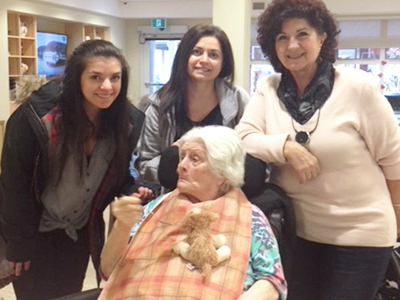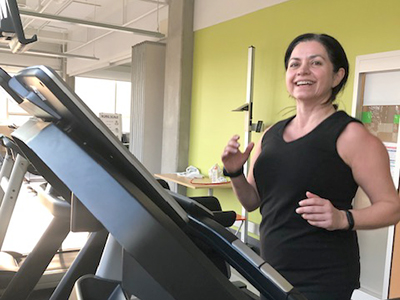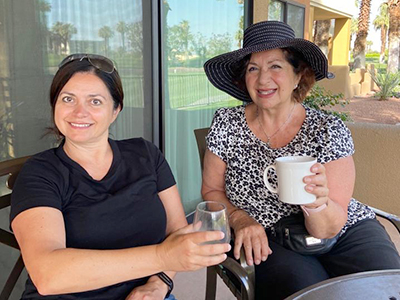
"I say yes to participate in research because not only are you most likely going to benefit yourself, you will help others find effective ways to better themselves with tested and proven methods."
– Diana Ljuljovic, North Vancouver
Diana Ljuljovic was surprised by sudden weight gain that started in her mid-40s. She consulted her family doctor, who assured her that she was still within a healthy range. However, Diana’s weight struggles continued into her 50s, leaving the registered massage therapist wondering whether this was linked to age-related hormonal changes and what was to come.
“My grandmother lived until 95 years of age, but in the last 10 years of her life, her cognition declined quickly,” recalls Diana. “I noticed that by the age of 70, my mother was showing early signs of dementia. I discussed this concern with my sister, saying we should take a proactive approach to prevent this from happening to us.”

Diana began scrolling through websites on weight loss and perimenopause — the period of time in which a woman loses her period and enters menopause — and landed on a page advertising for volunteers to participate in a study to examine the effects of exercise on the cognitive health of perimenopausal women.
“This study was a perfect match for me! I loved the idea of seeing if exercise could prevent or reduce my risk of developing dementia.”
“The difference between my grandmother and my mother is that my grandmother was quite active, spending her time gardening, working hard, walking a lot; whereas, my mother lived a more sedentary life sewing, reading, using the computer, bookkeeping, driving everywhere,” reflects Diana. “I wondered if that is why my mother’s signs of dementia started earlier than my grandmother’s.”
The link between exercise and brain health
Each year, millions of women around the globe transition into menopause. This perimenopausal phase of a woman’s life involves hormone fluctuations that can negatively impact sleep, and can cause hot flashes and weight gain. This time also puts women at greater risk of developing dementia, which contributes to the fact that around two-thirds of people living with Alzheimer’s disease in Canada are female.
Exercise has a protective effect against dementia; whereas, inactivity can increase the risk of developing dementia by 40 per cent.
“Scientific evidence suggests that perimenopause is a time of vulnerability for the brain,” says Vancouver Coastal Health Research Institute researcher Dr. Teresa Liu-Ambrose. Estrogen levels decrease during this time, reducing their protective effect on cognitive health and mood; yet, few research studies have examined the link between exercise and the brain health of perimenopausal women, Liu-Ambrose adds.

Diana participated in Liu-Ambrose’s ongoing “Burning calories, building brains in perimenopause: A critical window to reduce dementia risk in females” study. Participants gather at a research site three times per week for 40-minute, high-intensity interval training (HIIT) sessions on treadmills over the course of three months. HIIT classes are a proven safe and efficient way to improve fitness through a series of short workout intervals with short rest intervals in between.
“In the HIIT program, we started off running or walking at a faster pace, and then walked slowly for one minute. This increased over the weeks to about four minutes of running and two minutes of slow walking.”

Researchers monitored participants’ heart rates using wearable heart rate monitors to help participants reach their ideal max heart rate during the exercise program.
“I felt like I had a personal trainer!” Diana exclaims. “What I really liked about this was that I committed to something I feel was important to learn about, and that significantly improving your health doesn’t require a stressful program, it just requires consistency.”

As a participant, Diana received a PET-MRI scan at the start and end of the HIIT program to enable researchers to measure its impacts on her brain structure and function, as well as glucose metabolism within the brain. PET-MRIs provide detailed images of internal organs at work, such as the movement of chemicals and fluids in the brain.
“We are excited to have access to PET-MRI technology for this study, as there is evidence to show that the brains of females undergoing perimenopause have a reduced ability to use glucose as a source of fuel, which is also something that occurs naturally from the aging process and has been linked to cognitive changes,” says Liu-Ambrose.
Researchers also used PET-MRI scans to record participants’ myelin levels in the brain. Myelin is an insulating sheath around nerves in the nervous system, and is critical for brain health and communication between nerve cells.
“It was so interesting,” recalls Diana, who also completed blood work and memory, blood oxygenation and blood vessel tests as a study volunteer.
“After three months of consistent training, I felt amazing, and not only did I lose 15 pounds, my cardio and energy levels were so much better.”
With energy to spare, Diana can spend more time doing what she enjoys.
“I have now become a garment fitter for compression garments,” she says. “When I’m not working, I’m in the garden, fishing or prawning with my 85-year-old dad, travelling, walking on the West Vancouver seawall, cooking, entertaining and spending time with my family.”
Learn more about "Burning calories, building brains in perimenopause: A critical window to reduce dementia risk in females" and find out how to participate in this study.
This is one patient's story of participating in a research study. Your experience may differ. Learn about clinical trials before participating.


